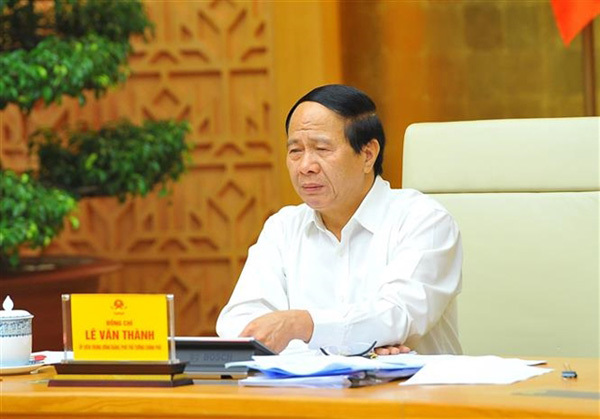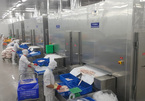 |
|
Deputy Prime Minister Le Van Thanh at the meeting.
|
The recommendation was raised at an online meeting chaired by Deputy Prime Minister Le Van Thanh with a number of localities to remove difficulties and obstacles for manufacturing enterprises in industrial parks and economic zones, export processing zones, high-tech zones and industrial clusters.
According to the report by the Ministry of Planning and Investment (MPI), in the context of the complicated developments of the COVID-19 pandemic, industrial parks and industrial clusters have implemented plans to limit impacts on business operations.
Production models were applied such as "3-on-site", "one route, two destinations", quick testing for workers to meet deadlines for orders, proactively seeking raw materials, cut operating costs, etc.
However, the ministry said that in addition to attracting investment, businesses in industrial zones face many difficulties, when the global supply chain is interrupted, causing a shortage of supply and output markets.
The pandemic also caused businesses to delay or cancel orders, so if the pandemic lasts for a long time, they may lose out on markets because customers change the supply chain.
In fact, input costs and transportation costs are increasing day by day, leading to a shortage of input materials and increasing the cost of production. The cash flow is severely short, making it difficult for the business to cover operating expenses, the ministry said.
In addition, the guidance on pandemic prevention and control is not reasonable all the time, sometimes applied rigidly in some localities, causing serious disruptions in the supply chain of production, consumption and export.
The Ministry of Planning and Investment said that, in addition to the impact of the COVID-19 pandemic, the guidance on COVID-19 prevention and control policies in localities has not been consistent, leading to congestion in the circulation of goods and movement of workers.
Nguyen Thi Bich Ngoc, Deputy Minister of Planning and Investment, emphasised the need for flexible and effective implementation of COVID-19 prevention and control policies and for favourable conditions for firms to maintain stable production and business activities.
A number of support policies for businesses have not been implemented and adjusted in time to suit the developments of the pandemic, and the application period for support policies is short, so it has not yet had any positive impacts on some businesses such as: tax relaxation and reduction policies; policies to support debt rescheduling, exemption and reduction of interest and fees.
Therefore, in this proposal, the ministry puts forward solutions such as implementing unified regulations on COVID-19 prevention and control, without causing difficulties for businesses.
The Government can support affected businesses with stronger policies such as exemption, reduction and postponement of corporate income tax, personal income tax and VAT.
The Government can also continue to support in cutting input costs and remove difficulties in cash flow for businesses and production facilities; synchronise policies on worker housing or operation sites for small and medium-sized enterprises, consider allowing enterprises to proactively organise appropriate production models; and remove difficulties in labour policies, especially for foreign experts entering Vietnam.
Concluding the meeting, Deputy PM Thanh suggested businesses proactively develop a plan to restore production, ensure safety for workers in pandemic prevention from production to circulation; coordinate with localities to agree on vaccination plans for workers, and carry out periodic testing as required.
The Deputy Prime Minister asked the Ministry of Health to have a specific plan to distribute vaccines to localities that are home to industrial zones and clusters.
Source: Vietnam News

'Three on-the-site' model to be adjusted to maintain production in the south
Deputy Minister of Industry and Trade Do Thang Hai said the ‘three on-the-site’ is a good model, but southern provinces have found it difficult to implement.

'3 on-site' model runs into problems as virus spreads inside isolated facilities
Enterprises in HCM City and other southern provinces have shelled billions of dong to implement the "3 on-site" model for business continuity however production at these facilities is still at risk of disruption due to the pandemic.